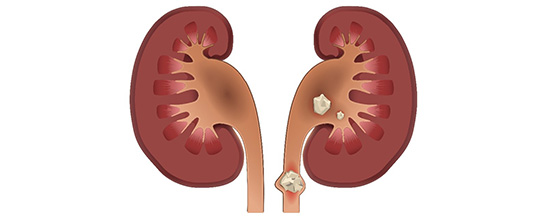How to Care for Your Child with a Kidney Stone
This leaflet will provide you with information about kidney stones, symptoms, diagnosis, treatment and home care advice.

What is a kidney stone?
Salt and minerals normally exist in the urine, may clump together to form the stones. Usually, they are carried out of the body when a child urinates, but sometimes they get stuck on the way out, which results in pain (renal colic), blood in urine and other symptoms.
Renal colic is the pain that occurs due to (a) stone(s) in the urinary tract.
What are the symptoms of kidney stones?
Some children can have no symptoms, and the stones are discovered incidentally.
Some others can present with one or more of the following:
- Pain in the belly or back
- Pink red, or brown urine, this may mean blood in the urine
- Cloudy urine or urine that smells unusual
- Feeling a constant urgent need to urinate.
- Pain or difficulty urination
- Nausea or vomiting
How is kidney stone diagnosed?
The doctor will ask a few questions about your child’s health and examine your child. Your doctor will decide if further investigation or blood tests are required. The investigation may include:
- Testing sample of your child urine
- Blood test
- X-ray or scan
How is kidney stone treated?
- Most kidney stones can be managed at home and with close follow up in the outpatient clinic.
- Giving pain medicine is important to relieve the pain
- Drinking plenty of fluids to facilitate the passage of the stones.
- You will be advised or contacted if your child requires any further outpatient follow up with a urology specialist
- Some children may need admission to the hospital, if:
- The stone is blocking the urinary tract
- The pain is not controlled with oral(by mouth) pain medicine
- The child is vomiting and unable to drink adequate amounts of fluids.
- The child is unable to take oral medicine
- Sometimes, breaking the stone into small pieces to help its removal can be a treatment option.
Home Care Advice
- Ensure that your child drinks plenty of fluids; this will help flush the stone out of the body.
- If your doctor advises giving medicine, you can give
- Paracetamol (any brand) or Ibuprofen (any brand)
- Follow the instruction on the medicine package for the correct dose for your child
- Do not give your child Aspirin as this can cause serious complication
Go to the Emergency Department if your child:
- Is unable to urinate
- Is vomiting uncontrollably
- Has a fever higher than 38.3 Celsius (101 F)
- Has Symptoms of urinary tract infection such as fever, chills, smelly urine
- Is not improving despite your doctor recommendations

